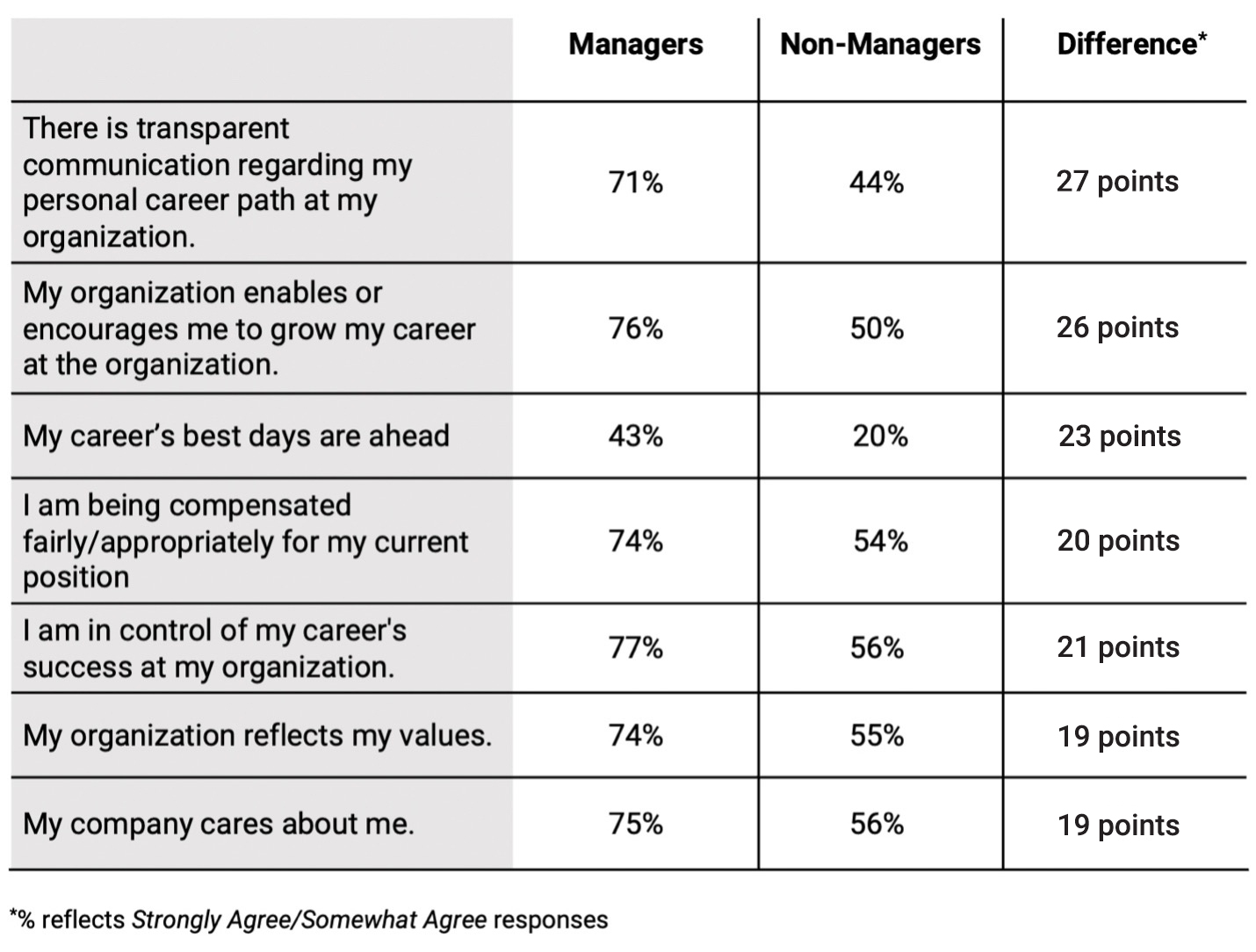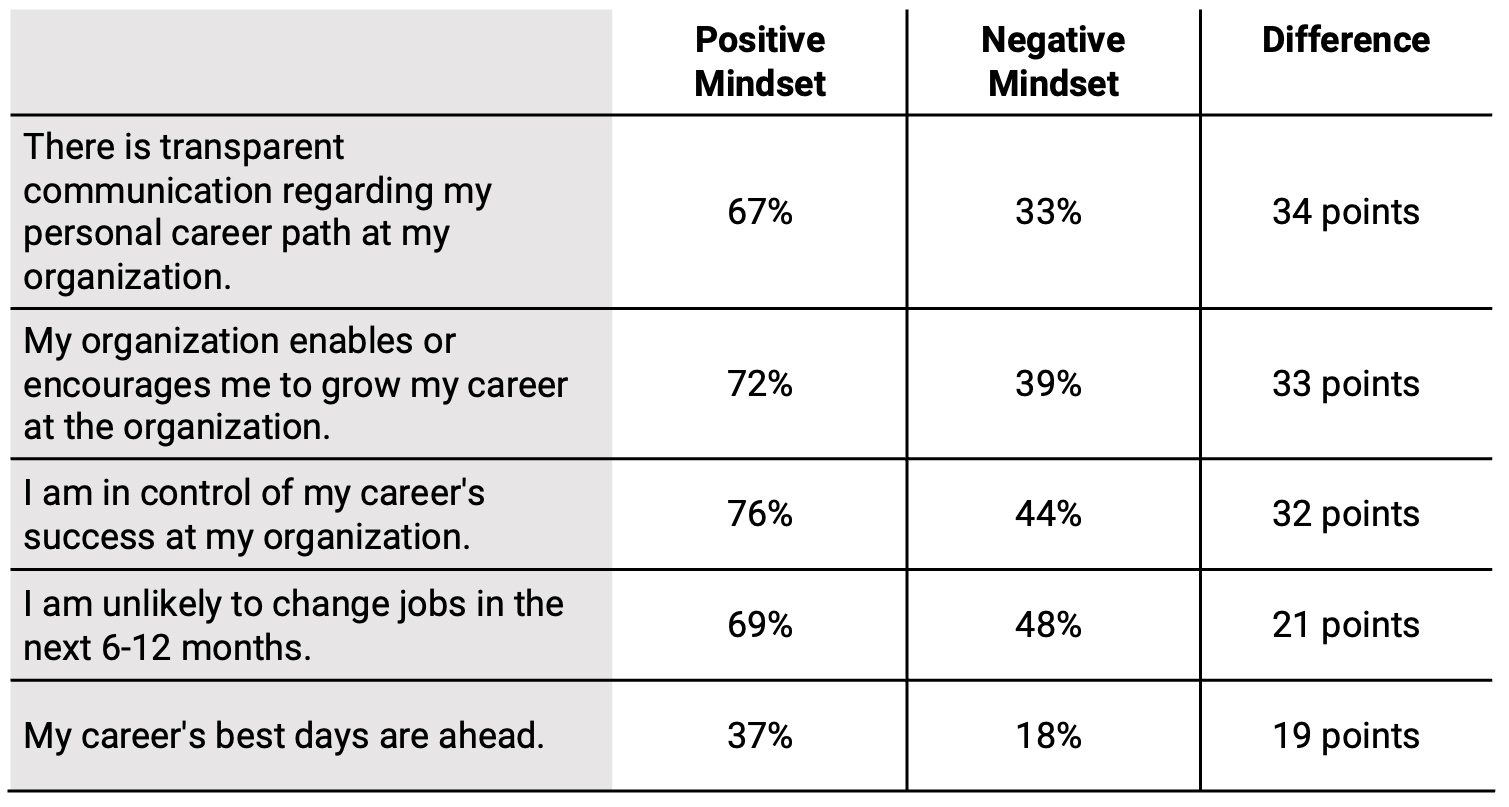In the first management training course I ever took, the instructor presented us with a simple formula:
Person + Environment = Behavior
In other words, your behavior is determined by who you are as an individual plus the context you find yourself in. Then she said, “At work, your manager is the single most important factor in creating your environment.”
Boom.
It’s true, isn’t it? Your manager is the person who sets your priorities, models behavior, and explains the organization to you. They decide what information to pass along and how to describe it. When they talk about a new idea or initiative with your team, do they seem excited? Bought in? Does it seem like they’ve really thought about it? Or are they just reciting it because they’re supposed to? Does it seem to affect their behavior? As an employee you’ll notice these things, because you’re always looking for clues in what your manager does.
And it goes beyond work priorities and initiatives. How does your manager treat you? Do they respect you? Coach you? Are you comfortable talking to them? Will they defend you and your work? What do you gather about the organization’s culture from how they treat you?
Now let’s flip the script. Suppose you’re a CCO or CHRO and you’re trying to get a message out to employees. All the emails in the world won’t move the needle as much as a manager who tells their team “this matters,” and then demonstrates it with their own behavior.
Managers are the heart of your culture.
But there’s a problem: In Integral’s annual survey of US employees*, we found that managers and non-managers have very different perceptions of the organizations they work in. This suggests that managers are not transmitting to employees the culture that they themselves experience.
The manager/non-manager split
In 2022, we fielded a study of over 2,000 working professionals in the United States across a range of industries and job roles. We found a striking disconnect in the ways that managers and non-managers described their relationships to their employers:
In addition to these attitudinal questions, managers and non-managers had very different answers to factual questions about their organizations. For examples, 62% of managers agreed with the statement “My organization has changed its IT security procedures to enable remote work,” as compared to 35% of non-managers – a 27-point gap. Even more striking: When asked “Is your organization in the midst of digital transformation”? only 24% of non-managers said yes – compared to 64% of managers.
How much does this matter? Multiyear research from the Sloan School at MIT identified 10 essential drivers of corporate culture – and the top four were management-related. Number one? “Employees feel respected.” And as we’ve seen, an employee’s manager is the biggest contributor to a sense of respect.
Is this thing on?
Compared to non-managers, managers are usually privy to more “inside” information, closer to senior leaders, and better compensated than regular employees. And the fact that they are managers means they have achieved a degree of career success. For all these reasons, it’s unsurprising that managers are somewhat more aligned with, and more positive about, the organization than regular employees. But the scale of the disconnect suggests two problems:
First, significant information is not reaching front-line employees – information about their own careers and the organization’s attitude toward them, as well as basic factual information about “what’s going on.” (A lack of factual information may be interpreted as a lack of respect, because it suggests that the organization doesn’t think informing them Is important.)
Second, while this should not need to be said, employee engagement and positivity are critical. Our research found that approaching one’s workday with a positive mindset is highly corelated with positive views on one’s own career:

Note that the single largest gap in positivity – 34 points! — was on the question of whether “There is transparent communication regarding my personal career path at my organization.” Who would typically communicate to an employee about their career path? That’s right: a manager.
So … do managers just suck?
No, managers do not suck (not most of them, anyway). Managers are often capable people being pulled in many directions at once. It’s a harder job than being either a front-line employee or an executive: You may not get paid much more than your employees, but you have to juggle far more duties. Not only are you accountable for the actual work of your department; you have a whole range of additional responsibilities in both people management and financial management. And you deal with a lot more of the messy implementation stuff than executives do. I’ve known senior employees who avoided management because they didn’t want the headaches. One of my own managers once told me, “Unless you want to become an executive later, being a manager isn’t worth it.”
This leaves us with two questions:
- If managers have such a tough job, why do they report higher levels of satisfaction than their employees? And
- If we assume that most managers are “good,” why aren’t they nurturing the same sense of belonging in employees that they feel themselves?
On the first question, I would argue that it comes down to the top issue MIT identified: feeling respected. I may have a hard job as a manager, but the company trusts me with that job. Executives come to me when they want to get things done, and I often have the autonomy to figure out how to get them done. I know that my work matters.
The second question is where it gets more interesting: Why don’t employees feel as positive as managers? In part, of course, it’s because employees may not have a job where it’s obvious how their work matters. But beyond that, it’s about the priorities that senior leaders set for managers – and that’s where the opportunity for real improvement lies.
Culture should be a strategic priority for managers – but it starts at the top
Lou Gerstner, the CEO who saved IBM in the 1990s, reflected on the experience years later. He said, “I came to see, in my time at IBM, that culture isn’t just one aspect of the game — it IS the game.”
Culture can’t be declared or enforced. It’s what people just do, a set of behaviors developed through observation and honed through a thousand small interactions. As we’ve seen, managers are the biggest factor in determining employee behaviors – so creating a positive environment for employees must be a core responsibility of managers. Employees who feel informed, cared for, and listened to will drive much better results for the organization than employees who feel uninformed and disengaged. Virgin Group CEO Richard Branson famously went so far as to say, “Clients do not come first. Employees come first. If you take care of your employees, they will take care of the clients.”
But nurturing culture your can’t just be delegated to managers. The most obvious reason is that managers are employees themselves. And like all employees, they’re highly attuned to what their bosses care about. If senior leaders say nice things about culture and employee growth but don’t really prioritize it, managers will get the message loud and clear: This is something we pay lip service to.
The role of senior leaders
Leaders up to the CEO must focus on taking care of employees. They should strive for some form of personal, two-way dialogue with employees – not just town halls, but round tables, 1-on-1’s, Q&A forums. They should also invest in communications programs that drive employee engagement and inclusion. Employees will see that their leaders care, and managers will model the behavior they see from executives. That’s how cultures change.
A great example is Neiman Marcus Group. In late 2019, NMG conducted an internal survey that asked employees to rank what they cared about most. The top four priorities? Career development, work flexibility, total rewards, and a focus on ESG (Environmental, Social, and Governance). Beginning in January 2020, NMG assessed all of its policies against these priorities and began to invest accordingly. The company launched a range of career development programs, expanded paid parental leave for any associate who welcomes a new child, introduced paid family leave, and instituted a “work anywhere” policy for many employees. Over the last two years, NMG has seen improved employee ratings on Glassdoor in Compensation and Benefits, Culture, DEI, Senior Leadership, and Career Opportunities.
Integral can help
If you’re looking to improve your organizational culture, boost employee engagement, or rethink manager competencies, we’d love to hear from you. Let’s figure it out together. Let’s talk.
* The Integral Employee Activation Index is conducted every year in collaboration with The Harris Poll.
